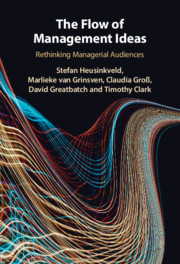Book contents
- The Flow of Management Ideas
- The Flow of Management Ideas
- Copyright page
- Contents
- Figures
- Tables
- Acknowledgements
- 1 The Flow of Management Ideas
- 2 Studying Audiences
- 3 Creating a Positive Atmosphere among the Audience
- 4 Conveying the Applicability of Ideas to Audience Members
- 5 Defining Audience Orientations
- 6 Understanding Audience Dynamism
- 7 Managerial Audiences in Organisational Contexts
- 8 Managerial Audiences and Fan Involvement
- 9 Conclusion
- Appendix A Overview of Informants
- Appendix B Glossary of Transcription Symbols
- References
- Index
7 - Managerial Audiences in Organisational Contexts
Published online by Cambridge University Press: 22 May 2021
- The Flow of Management Ideas
- The Flow of Management Ideas
- Copyright page
- Contents
- Figures
- Tables
- Acknowledgements
- 1 The Flow of Management Ideas
- 2 Studying Audiences
- 3 Creating a Positive Atmosphere among the Audience
- 4 Conveying the Applicability of Ideas to Audience Members
- 5 Defining Audience Orientations
- 6 Understanding Audience Dynamism
- 7 Managerial Audiences in Organisational Contexts
- 8 Managerial Audiences and Fan Involvement
- 9 Conclusion
- Appendix A Overview of Informants
- Appendix B Glossary of Transcription Symbols
- References
- Index
Summary
In this chapter we ask the question: How is the social use of management ideas in organisational contexts related to the relative power positions of individual audience members? Based on interviews with management practitioners who have attended management guru lectures, the chapter sheds essential light on how and why different audience members may actively use management ideas in an organisational context as the ‘natural setting’ of idea consumption. First, we offer a broader view on the nature of agency that plays a role shaping the organisational use and ultimate impact of management ideas by revealing how the interpersonal use of management ideas involves three different forms of resource-related power (influence, force and domination). Second, rather than considering agency in the organisational use of management ideas mainly in terms of such a top-down direction, our analysis suggests the importance of accounting for multiple directions as audience members’ accounts reveal how the forms of power are deployed and reconstituted in relational interactions of a downward, lateral or upward fashion.
Keywords
- Type
- Chapter
- Information
- The Flow of Management IdeasRethinking Managerial Audiences, pp. 141 - 160Publisher: Cambridge University PressPrint publication year: 2021

